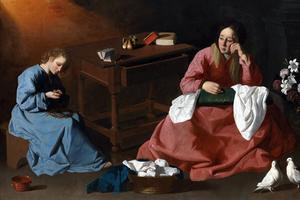St. Thomas Becket vs. the King
Becket’s stalwart faith brought the wayward King Henry II back to his knees and back to God.

The 12th-century martyrdom of St. Thomas Becket is one of those grisly chapters of history seemingly plucked from the script of a gore-laden HBO show.
Becket, the Archbishop of Canterbury, was cut down in 1170 by multiple knights of King Henry II while going to pray in his cathedral. His death was witnessed by several monks, who recorded in great detail the violence of his final moments and the brutality displayed by his murderers. The accounts note that the archbishop was encouraged to lock the cathedral doors to shut out the murderous knights, but that he refused to “make the house of God into a fortress.” Eyewitnesses reported how he fell to his knees from the first blow and made peace with his Lord and his impending death before the final – and multiple – fatal blows landed.
It’s a shocking story, and though martyrs are not rare in the Communion of Saints, his story seems odd as he was the most powerful Churchman in his own land, and was killed not by a pagan regime but rather by the liegemen of his Catholic king and once-closest friend.
The lives of St. Thomas Becket and his old friend (and ultimate nemesis) tell the story of power and how we respond to it. On the one hand is King Henry II, whose friendship with Becket predated his reign. Henry II was an effective administrator and ruler, but once he ascended the throne, he grasped power beyond his crown, wishing to exert more control in Church affairs and distance the clergy in his country from the papacy. As his efforts were thwarted, he became more frustrated and volatile, eventually lashing out at Becket, once his most trusted advisor, and forcing him into exile for six years.
On the other hand is St. Thomas Becket, a tenacious and charismatic man who rose far above his station as a merchant’s son to become the Archbishop of Canterbury. He was known for his extraordinary drive, and razor sharp wit, if not for his piety. Henry II likely hoped his ambitious friend, once named to the prestigious archbishopric, would prove to be an asset in his schemes for subduing the Church.
However, in a turn that baffled his contemporaries, and continues to stymie historians, Becket, once named the most powerful bishop in the country, pivoted away from worldly pursuits. Even as his power and influence grew, he adopted a life of penance and prayer, wearing a hairshirt under his bishop’s robes and fasting often. Far from aiding Henry II in his efforts, he refused to grant any concessions, especially in regards to the king’s effort to do away with the clergy’s right of trial by a Church court. Becket recognized that such an encroachment could lead to a tremendous weakening of the Church’s authority in the country to the detriment of the hundreds of thousands of souls under her protection in England. His refusal to acquiesce to Henry’s demands forced Becket to flee the country, living in exile in France for six years while the Pope attempted to negotiate his return to Canterbury with Henry on his behalf.
Eventually in 1170, Becket was allowed to return, though clearly with the expectation that he would pose no more of a threat to Henry’s plans. Becket had no intention of giving into the king, and after excommunicating several of the king’s supporters, an irate Henry II allegedly begged someone to rid him of the “troublesome priest.” Despite later claims that the king had not intended violence to follow, four of his knights took him at his word and the bloody episode at Canterbury Cathedral ensued.
As he died, Becket’s last words surrendered his life to God.
Becket’s courage and fortitude are no doubt inspiring, but what may be the most striking part of the story comes four years later, when Henry II, who deeply grieved his friend’s murder and bitterly regretted his role in inciting the violence, publicly repented for his sins against the Church and performed a pilgrimage to the newly-canonized Becket’s tomb. For a night, the king, who had risked his immortal soul for power on earth, kept vigil beside the grave of his martyred friend, atoning for his death.
St. Thomas Becket received tremendous power – yet rather than being consumed by it, he instead offered everything he had, even his life, back to God. In so doing, he allowed his life and death to bear fruit throughout eternity. Notably, his stalwart faith, and his unyielding defense of Truth, brought a wayward king back to his knees and back to God.
St. Thomas Becket, pray for us!
- Keywords:
- st. thomas becket
- martyrs















